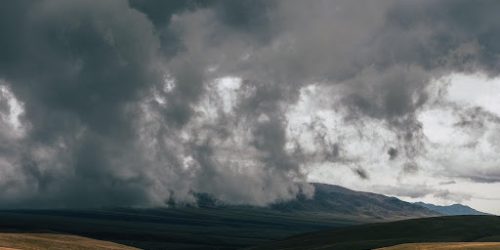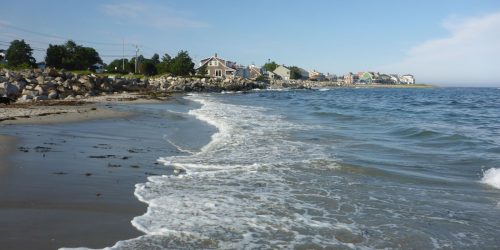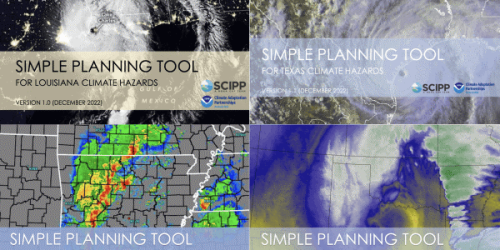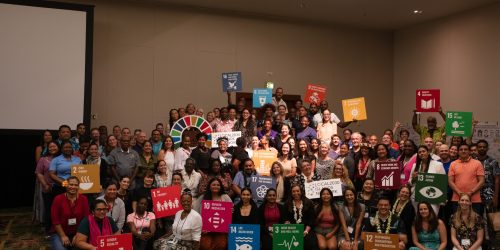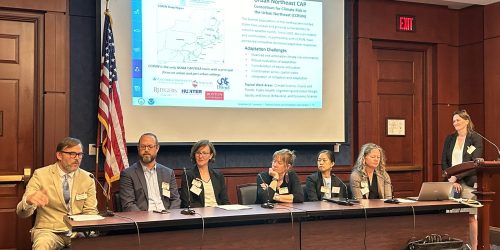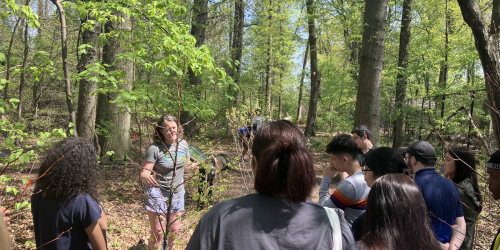CPO’s Regional Integrated Sciences and Assessments (RISA) program is announcing 9 new 5-year RISA teams in Fiscal Year 2021 that aim to conduct research and engagement in each of the regions mentioned above. RISA teams focus on multiple societal issues relevant to their region, and develop a set of interconnected projects related to these issues.
In addition to core team funding, RISA is funding four teams to conduct small-grants competitions to better connect RISA climate expertise with community organizations serving under-resourced communities. With funding from CPO’s Assessments Program, two teams will also host and support sustained assessment specialists to work on regional climate assessment activities and connect regional knowledge and networks with the National Climate Assessment. The competitively selected RISA teams total $51,490,2541 in cooperative agreements over the five-year period.
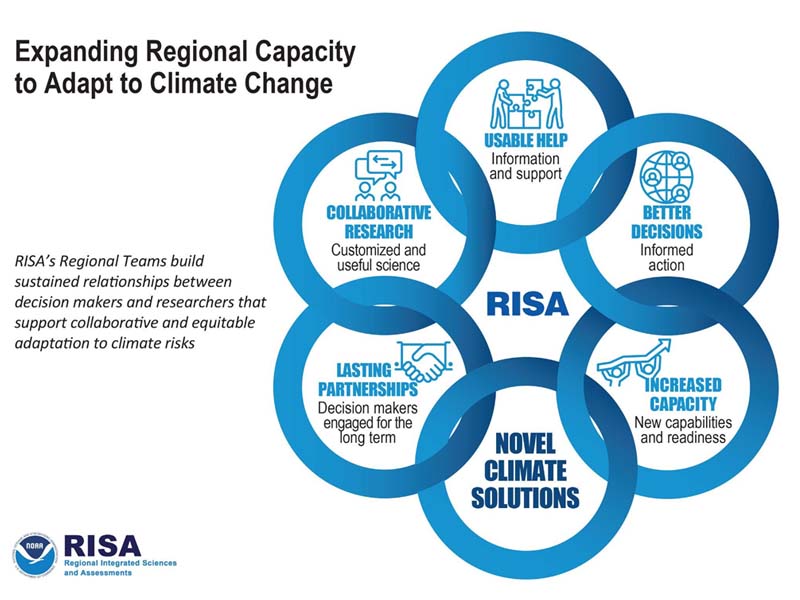
The RISA program expands regional capacity to adapt to climate change. RISA’s regional teams build sustained relationships between decision makers and researchers that support collaborative and equitable adaptation to climate risks.
A central tenet of the RISA program is that learning about climate adaptation and resilience is facilitated by and sustained across a wide range of experts, practitioners, and the public. As such, the RISA program supports a network of people, prioritizing wide participation in learning by doing, learning through adapting, and managing risk with uncertain information.
Early decades of the program focused on understanding the use of climate information at regional scales (e.g. through experimental seasonal outlooks), improving predictions and scenarios, building capacity for drought early warning, and advancing the science of climate impact assessments. More recently, RISA has shifted its emphasis to address the growing urgency to advance approaches that tackle the complex societal issues surrounding adaptation planning, implementation, and building community resilience. To do so, RISA continues to prioritize collaborative approaches that incorporate multiple knowledge sources and integrate social, physical, and natural science, resulting in long-term support of and increased capacity for communities.
As the adaptation community in the United States advances and evolves, RISA seeks to support new, creative, solution-oriented approaches that are both responsive to communities and that integrate across silos of scientific knowledge and expertise.
The 9 new projects2 funded by the RISA program in FY21 are:
- [Alaska] The Alaska Center for Climate Assessment and Policy (ACCAP): Building Healthy and Thriving Alaskan Communities, Economies, and Ecosystems in a Changing Climate
This RISA team’s portfolio of interwoven research and engagement in Alaska will support the underlying vision of building healthy and thriving Alaskan communities. Core themes include extreme events and impacts and capacity building in support of Tribal resilience. In the extreme events work, the team will use an integrated scientific approach that brings together social science, climate science, and local expertise to: a) document socio-economic impacts of extreme climate and weather events in Alaska; b) engage practitioners to determine and meet information needs; and c) analyze historical and projected changes in extreme event occurrences to inform policy and decision-making. The work will support Tribal resilience by: a) bridging community-level climate adaptation planning and implementation with workforce and economic development; b) investigating and supporting boundary spanning and knowledge co-production between Alaska Native communities and climate and related researchers; c) innovating evaluation methodology and elevating Indigenous evaluation of climate-related knowledge co-production and climate adaptation. Hallmarks of new outreach and engagement activities in this project include assessment products that encompass societal impacts and adaptation, training for students and postdoctoral fellows, online course development, and enhanced convening activities with a focus on serving the needs of policy-makers, Alaska Native Peoples, tribes, and organizations throughout the state. This team includes a sustained assessment specialist and small-grant competition, which like the core portfolio, aims to fulfill ACCAP’s vision of thriving Alaskan communities, economies, and ecosystems.- Co-Lead PIs: Sarah Trainor, University of Alaska Fairbanks and Alaska Fire Science Consortium; Nathan Kettle, Experimental Arctic Prediction Initiative at the University of Alaska Fairbanks
- Co-PIs: John Walsh, University of Alaska Fairbanks; Adelheid Hermann, University of Alaska Fairbanks
- [Carolinas] Innovating a Community-Based Resilience Model on Climate and Health Equity in the Carolinas
This RISA team will build upon years of regional work on climate science, tools and assessments to move into a new phase that centers Justice, Equity, Diversity, and Inclusion (JEDI) principles at the forefront of NOAA-funded climate research and to deliver climate futures to more communities than have been previously served. They will apply a bottom-up participatory action approach to develop a transferable model for end-to-end co-production of actionable and equitable climate resilience solutions in at-risk communities in the Carolinas. The team’s aims include: Aim 0. Demonstrate our commitment to address the climate reality in a just and equitable way, while ensuring the inclusivity and diversity of all voices are represented in every aspect of our work in the Carolinas; Aim 1. Build and enhance local partnerships in underserved communities across the Carolinas to identify, test, and refine equitable solutions for climate resilience; Aim 2. Understand and predict how co-occurring and consecutive hazards interact with exposure and vulnerability to shape climate risk; Aim 3. Identify and connect the complex linkages between structures of power, intersecting social positions, and climate-health inequities in vulnerable communities; and Aim 4. Design and implement community-sciences programs to track physical and social science metrics and build community-level climate resiliency literacy.- Co-Lead PIs: Kathie Dello, North Carolina State Climate Office & North Carolina State University; Jennifer Runkle, North Carolina State University; Louie Rivers, North Carolina State University
- Co-PIs: Antonia Sebastian, University of North Carolina Chapel Hill; Geoffrey Habron, Furman University; Miyuki Hino, University of North Carolina Chapel Hill; Tonya Gerald-Goins, North Carolina Central University; Jane Harrison, North Carolina Sea Grant; Florence Anoruo, South Carolina State University; Max Cawley, North Carolina Museum of Life and Science
- [Great Lakes] Great Lakes Integrated Sciences and Assessments (GLISA)
The organizing theme for GLISA’s next five years (Phase III) is how to accelerate and scale-up the impact of climate knowledge in the Great Lakes region to inform sustainable and equitable adaptation action. The team will realize this aspiration by fostering four main goals. First, GLISA will explore action-driven foundational research focusing on new and emerging issues in the Great Lakes region to better understand, assess, and co-produce actionable adaptation knowledge. This includes: a) modeling multiple stressors and opportunities (climatic and non-climatic) to simulate future scenarios to inform urban planning through time; b) exploring the role of diverse participation in shaping scenario outcomes and participants’ perception of adaptive capacity, and assessing adaptive capacity longitudinally in small- and mid-sized Great Lakes cities; c) exploring how tensions in the relationship of tribes with water may shape plans and solutions for adaptation; d) expanding GLISA’s Great Lakes Ensemble by focusing on extreme precipitation, evaluating new datasets, and generating new state-of-the-art climate simulations using a convection-permitting regional climate model coupled to a 3D lake model; and e) co-developing and demonstrating adaptive management strategies to reduce weather- and climate-related risks in agricultural production systems. Second, GLISA will actively build upon their ten-year experience of co-producing knowledge to scale-up their existing engagement, tools, and approaches. They will particularly focus on vulnerable urban and other traditionally under-resourced communities in the Great Lakes region through their Small Grants Program, transdisciplinary research, and new partnerships with the College of Menominee Nation (CMN) and Extension Programs in Wisconsin, Minnesota, New York, and Michigan. Third, GLISA will actively broaden participation in their research, engagement, and training, especially tending to issues of Justice, Equity, Diversity, and Inclusion (JEDI). And fourth, GLISA will design and implement an integrated and adaptive external evaluation program for the five years of GLISA’s Phase III.- Co-Lead PIs: Maria Carmen Lemos, University of Michigan; Jeffrey Andresen, Michigan State University
- Co-PIs: Matthew Gammans, Michigan State University; Thomas Kenote, College of Menominee Nation; Michael Notaro, University of Wisconsin Madison; Richard Rood, University of Michigan
- [Intermountain West] Western Water Assessment (WWA): Building Resilience to Compound Hazards in the Intermountain West
This RISA team’s vision is to build water sector and community resilience to compound hazards in the Intermountain West, with a particular focus on underserved Indigenous and small rural communities and utilities. By carefully constructing their activities, WWA will also advance resilience science from theory to practice. The team has developed an integrative set of 10 projects and other research and integration activities that draw on their 20-year history of climate adaptation research and activities in the region, and the deep interdisciplinary social and natural science expertise in their team. Their research projects fit within two themes: resilient water systems and resilient communities, and they will integrate tracking of resilience metrics to identify needs and opportunities and evaluate their success in building resilience. This award includes a small-grant competition to develop a network in Wyoming to build resilience of underserved communities and leverage successes to inspire other communities to engage in climate adaptation actions.- Co-Lead PIs: Lisa Dilling, University of Colorado Boulder; Benét Duncan, University of Colorado Boulder
- Co-PIs: Ben Livneh, University of Colorado Boulder; Karen Bailey, University of Colorado Boulder; Corrie Knapp, University of Wyoming; Court Strong, University of Utah
- [Mid-Atlantic] Mid-Atlantic Regional Sciences and Assessments (MARISA) 2.0: Continuity and Expansion of Community-Based Engagement and Support
This RISA team will address the following question: How can we best support communities in the Mid-Atlantic region in their efforts to leverage actionable climate science to make informed decisions about adapting and building resilience to a changing climate? MARISA 2.0 builds on experience gained, partnerships forged, progress made, and lessons learned over the course of MARISA’s first five years. MARISA’s objectives are to: (1) assess and address the climate-sensitive needs of vulnerable communities in the region; (2) advance capabilities for community adaptation planning through co-production of data, information, and tools; (3) build workforce capacity through robust engagement of diverse students and partners; and (4) evaluate program impacts, particularly in socially vulnerable communities. MARISA 2.0’s support for regional climate adaptation activities will be complemented with research and outreach focused in three geographic areas: Baltimore, MD, Pittsburgh, PA, and the rural coastal communities of Virginia. Stormwater management remains a primary focus in the region as communities struggle to cope with extreme precipitation events. In coastal communities, tidal flooding compounded by sea-level rise (SLR) and extreme precipitation is a growing concern. In urban areas, mitigating the emerging public health threats posed by extreme heat will require a range of responses. The greatest impacts of these changing climate forces often fall disproportionately on low-income communities and communities of color. MARISA 2.0’s proposed work is built on meaningful engagement with community-based organizations and local governments to improve understanding of vulnerabilities and response actions and to help relieve the disproportionate burden.- Lead-PI: Debra Knopman, RAND Corporation
- Co-PIs: Klaus Keller, The Pennsylvania State University; Melissa Finucane, RAND Corporation
- [Northeast] Supporting Regional Implementation of Integrated Climate Resilience: Consortium for Climate Risk in the Urban Northeast (CCRUN) Phase III
This RISA team consists of natural, applied, and social scientists with deep stakeholder relationships and core competencies in the topic areas of climate science, coasts and floods, public health, engineering and urban design, equity, and social, behavioral, and economic science. CCRUN will conduct collaborative research in these topic areas to provide the consistency and continuity of information that underlay the region’s adaptation advances in CCRUN Phases I and II. Additionally, CCRUN will manage integrated projects focused on: 1) Compound extreme events; 2) Coastal and inland flooding; 3) Urban-rural linkages;and 4) Alignment of sustainability, adaptation, and emissions reductions goals in resilience planning. While each project employs context-specific methodologies, several overarching approaches will guide CCRUN’s engagement with decision-makers: knowledge exchange, needs assessment, community-scale capacity building, and web-based tools. The outcomes of CCRUN’s work embody solution-based science driven by the needs of our partners and stakeholders and include: 1) advancement of the climate science of emergent risks, 2) enhanced understanding of the intersection of climate risk and vulnerability at new scales, and 3) development of integrative adaptation science linking urban climate risk management and other community challenges. Emergent benefits include advancing the sustainability, scalability, and evidence-base of adaptation efforts. This award includes a small-grant competition targeting organizations working with socially vulnerable populations in communities that are exposed to climate risks.- Lead-PI: Radley Horton, Lamont-Doherty Earth Observatory, Columbia University Earth Institute
- Co-PIs: Patricia Fabian, Boston University; Robin Leichenko, Rutgers University; Malgosia Madajewicz, Columbia University; Franco Montalto, Drexel University; Philip Orton, Stevens Institute of Technology; William Solecki, City University of New York-Hunter College
- [Pacific Islands] The Pacific RISA Phase IV: Building Equitable and Just Climate Solutions for Pacific Island Resilience to Compound Disasters and Extreme Events
This RISA team will address the overarching question: How can we support and develop sustainable, equitable, and just climate solutions that increase Pacific Island resilience to compound disasters and extreme events? Project objectives are integrated and build upon Pacific RISA’s progress for more than a decade, as they: 1) conduct baseline evaluative research to identify factors that inhibit equitable climate adaptation and integrate metrics programmatically; 2) identify new technical linkages between data, models, and projections for Hawaiʻi and the US-Affiliated Pacific Islands (USAPI); 3) utilize project outputs to inform adaptation strategies and quantify the costs of extreme scenarios through the creation of an integrated exposure and risk mapping tool; and 4) coordinate peer-to-peer exchanges across sectors, islands, and regions to enhance the scalability and transferability of project outputs. Underpinning all projects are commitments to environmental and climate justice, transparency, and the inclusion of communities that are vulnerable as a result of social and physical conditions. Tracking these objectives will be the focus of ongoing and iterative program evaluation. A dedicated Program Manager will integrate the efforts of staff and PIs, and liaise with partners and other regional climate programs. The Sustained Assessment Specialist position will support the U.S. National Climate Assessment (NCA) and, beginning with the networks involved in recent Pacific Islands Regional Climate Assessment (PIRCA) reports, engage additional groups and identify specific needs for in-depth regional assessments.- Lead-PIs: Victoria Keener, Arizona State University & East-West Center; Laura Brewington, Arizona State University & East-West Center
- Co-PIs: Maxine Burkett, University of Hawai’i at Mānoa; Abby Frazier, East-West Center; Thomas Giambelluca, Water Resources Research Center & University of Hawai’i at Mānoa; Zena Grecni, East-West Center; John Marra, NOAA National Center for Environmental Information (NCEI); Kirsten Oleson, University of Hawai’i at Mānoa; Christopher Shuler, University of Hawai’i at Mānoa; Matthew Widlansky, Joint Institute for Marine and Atmospheric Research (JIMAR) & University of Hawai’i at Mānoa
- [Pacific Northwest] The Northwest Climate Resilience Collaborative: Centering Frontline Communities in Climate Adaptation Science, Assessments, and Solutions
This RISA team will assist communities on the frontlines of climate change in pursuing their own resilience objectives, while ensuring that local-scale and place-based innovations are scaled out and up to support broader resilience in the Northwest, across the RISA network and in state and federal climate resilience efforts. Frontline communities are centered in this team: they participate on the Leadership Team, help shape and implement the research agenda and connect NCRC efforts with community-based resilience efforts across the nation. The NCRC team brings unmatched experience and proven success in co-developing applied research in partnership with public and private entities, and facilitating the use of science in complex climate adaptation and resilience challenges. NCRC’s work will lead to: (1) significant advances in the theory and practice of advancing climate resilience in frontline communities; (2) evidence and models for effectively elevating community-driven approaches to climate resilience; (3) centering climate justice and frontline communities within the scientific enterprise; and (4) enhanced diversity and inclusion in regional climate sciences and services. This award includes a small-grant competition, which will support frontline community resilience initiatives through a participatory grant process, establish representative communities of practice, and scale local solutions up to decision-makers and out for regional learning. - Lead-PI: Amy Snover, Climate Impacts Group & University of Washington
- Co-PIs: Jennifer Allen, Portland State University; Russell Callender, Washington Sea Grant & University of Washington; Aurora Martin, Front and Centered; Don Sampson, Affiliated Tribes of Northwest Indians; Meade Krosby, University of Washington; Guillaume Mauger, University of Washington; Crystal Raymond, University of Washington; Jason Vogel, Climate Impacts Group & University of Washington; Patricia Hernandez, Headwaters Economics; Katrina Running, Idaho State University; Chad Kruger, Washington State University; Marco Hatch, Western Washington University
- [South Central] Southern Climate Impacts Planning Program (SCIPP) Phase IV: Planning for Long Term Change in a Short Term World
This RISA team will examine communities through multiple lenses: climate-informed planning, developing governance and collaborative capacity, extreme events in a changing climate, and climate justice. Together, these are designed to help them become more resilient. Learning how to incorporate climate information effectively into long-term plans opens opportunities for mitigating climate impacts. Recognizing the financial and policy levers available to communities reveals how disasters can become sources of future resilience. Understanding how climate change is and may affect the frequency and intensity of events equips communities with foresight and preparedness. Climate justice assures that all members of communities have a voice and are represented in policies and activities taken to lessen the impacts of future events. These research themes are supported by a core office that coordinates individual research projects, collaborates with stakeholders, synthesizes information for distribution through networks across the region, and assesses progress toward reducing climate risks and impacts. The project team includes expertise in climatology, meteorology, climate adaptation, political science, public administration, geography, engineering, sustainability, and environmental justice. The core office is advised by regional stakeholders and national experts participating in an advisory committee. The core office also connects closely with other regional climate services partners, including the USGS South Central Climate Adaptation Science Center, USDA Southern Plains Climate Hub, NOAA Southern Regional Climate Center, and State Climate Offices.
1 The funding will be distributed over the life of the projects and future-year funding is conditional on appropriations.
2 At the time of publication, all awards may not have been accepted by recipient institutions



